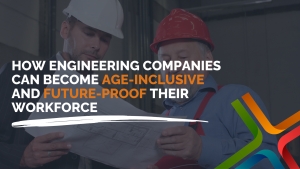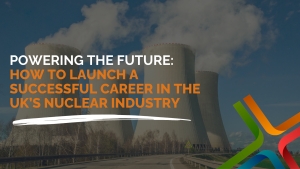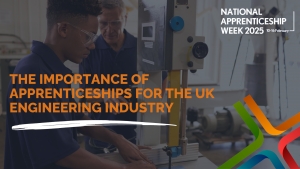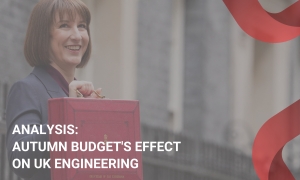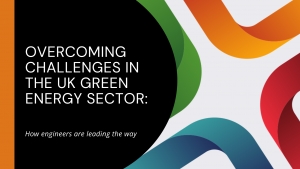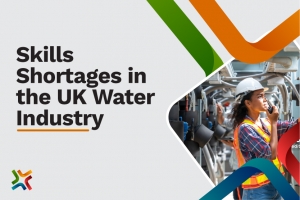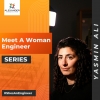How Engineering Companies Can Become Age-Inclusive and Future-Proof Their Workforce
In a significant step forward, we've proudly signed the Age-Friendly Employer Pledge with the Centre for Ageing Better. This commitment marks more than just a pledge - it's a promise to shape workplaces where professionals of all ages, particularly those aged 50 and over, can thrive and contribute meaningfully.
Engineering firms, long driven by innovation and progress, must now turn their focus to one of the most transformative shifts in the labour market: age diversity.
Why Age Inclusivity Matters in Engineering
By 2030, 50% of UK adults will be aged 50 or over, a seismic demographic shift that requires a rethinking of recruitment and retention strategies. Engineering, like many sectors, faces a talent shortage, and overlooking older professionals only exacerbates the problem.
Traditional perceptions often view ageing as a decline in potential. But the reality is that experienced professionals bring valuable skills, mentorship capabilities, and deep institutional knowledge.
1. Adopt Age-Inclusive Recruitment Practices
To build an age-diverse engineering workforce, start at the source: hiring.
- Write inclusive job descriptions: Avoid language like “young and dynamic” or “recent graduate preferred.” Instead, focus on skills and competencies.
- Advertise roles on platforms targeted at over-50s: Partner with organisations that specialise in older workers, like Rest Less or Age Diversity Network.
- Use age-blind application processes: Mask dates of graduation and early employment history to reduce unconscious bias.
2. Leverage the Experience of Older Engineers
Many engineering firms focus on early-career development but overlook the benefits of retaining and empowering seasoned professionals.
- Create mentorship programs where older engineers share knowledge with younger colleagues.
- Offer project leadership roles to senior professionals, tapping into their expertise without the intensity of hands-on design work.
- Recognise achievements and contributions of older staff through internal awards or spotlights.
Dis you know? Age-inclusive companies often see greater knowledge retention and fewer costly errors due to experienced oversight.
3. Provide Flexible Work Options
Older employees may have different lifestyle needs. Offering flexible work arrangements is a key factor in retention and engagement.
- Part-time roles, consultancy contracts, or phased retirement plans enable experienced professionals to stay in the workforce longer.
- Invest in ergonomic assessments and adaptive tech for workers who may have specific physical requirements.
Did you know? Research shows that flexible work policies can boost retention by up to 20% among older workers.
4. Rethink Workforce Planning
Engineering firms must plan for the future by building age diversity into their talent strategy.
- Conduct age audits to understand workforce demographics and plan for succession.
- Align your diversity and inclusion policies with age-friendly goals.
- Include age as a key pillar in your DEI strategy, not just a footnote.
Future-proofing engineering firms means acknowledging that a multigenerational workforce drives innovation and resilience.
5. Promote a Culture That Celebrates Age
Age-friendly workplaces thrive when there's a cultural commitment at every level.
- Train hiring managers and leaders to recognise and eliminate age bias.
- Share internal success stories of employees over 50 to reshape narratives.
- Encourage intergenerational collaboration through team-building and project pairing.
A company culture that values every stage of life is one that retains its best talent longer—and performs better as a result.
Our Mission
As engineering evolves to meet the challenges of tomorrow, age inclusivity isn't just ethical – It's essential. At Alexander Associates, our Talent Advisory services help engineering firms navigate the changing landscape with strategies that build resilient, diverse, and future-ready teams.
By embracing older professionals, you're not only addressing talent gaps – You're enriching your organisation with depth, wisdom, and long-term sustainability.
Contact us today to learn how your business can become a leader in age-inclusive workforce planning.
01959 562 572
Powering the Future: How to Launch a Successful Career in the UK’s Nuclear Industry
The UK's nuclear industry is experiencing a significant resurgence, presenting a wealth of opportunities for those eager to embark on a career in this dynamic sector. With the government's commitment to expanding nuclear capacity to 24 GW by 2050, the industry is poised for substantial growth, necessitating a skilled and diverse workforce.
Understanding the UK's Nuclear Landscape
As of 2024, the civil nuclear sector in the UK employs approximately 86,908 individuals, marking a 60% increase over the past decade. This surge is largely attributed to major projects like Hinkley Point C and Sizewell C, which have significantly boosted employment in regions such as the South West and North West of England.
Diverse Career Paths in Nuclear Energy
The nuclear industry offers a broad spectrum of career opportunities across various disciplines:
- Engineering: Roles include nuclear, mechanical, electrical, and civil engineering, focusing on the design, maintenance, and decommissioning of nuclear facilities.
- Project Management: Professionals oversee the planning and execution of nuclear projects, ensuring they adhere to safety standards and timelines.
- Safety and Environmental Management: Specialists ensure compliance with environmental regulations and the safe handling of nuclear materials.
- Research and Development: Scientists and engineers engage in innovative projects, such as developing Small Modular Reactors (SMRs) and advancing nuclear fusion technologies.
Competitive Salaries in the Nuclear Industry
A career in the nuclear sector is not only rewarding but also financially attractive. According to industry data, the average salary in the UK nuclear sector is around £50,000 per year, significantly higher than the average salary in general engineering, which is approximately £38,000 per year. Senior engineers and project managers in the nuclear industry can earn upwards of £70,000 to £100,000 per year, particularly in high-demand roles such as nuclear safety and regulatory compliance.
Moreover, apprenticeships and graduate programs in nuclear tend to offer competitive starting salaries, often ranging from £27,000 to £35,000, which is higher than many other engineering graduate roles. This makes nuclear a financially stable and lucrative career choice compared to other engineering disciplines.
Pathways into the Nuclear Sector
- Apprenticeships: Ideal for those seeking hands-on experience while earning qualifications. Organisations like the National College for Nuclear offer apprenticeships in science, engineering, project management, and business administration.
- Graduate Schemes: Many leading companies, including EDF Energy and Rolls-Royce, provide structured graduate programs that offer comprehensive training and development opportunities.
- Specialised Courses: Pursuing degrees or certifications in nuclear engineering, physics, or related fields can enhance your prospects. Institutions like the University of Birmingham offer postgraduate courses tailored to the nuclear industry.
Staying Informed and Building Networks
Engaging with professional bodies and networks can provide valuable insights and opportunities:
- Nuclear Institute (NI): As the UK's professional body for the nuclear industry, NI offers resources, events, and networking opportunities for professionals at all stages of their careers.
- Young Generation Network (YGN): A branch of the NI, YGN focuses on supporting young professionals through events, lectures, and facility tours, fostering knowledge transfer and professional development.
Transferable Skills and Industries of Interest
The nuclear sector actively seeks professionals from various industries with transferable skills. Key skills that can transition well into nuclear roles include:
Health and Safety Expertise: Professionals from construction, oil and gas, and manufacturing industries bring strong knowledge of risk management and regulatory compliance.
Project and Programme Management: Those with experience in infrastructure, aerospace, and defence are well-equipped for managing complex nuclear projects.
Technical and Engineering Skills: Individuals from automotive, power generation, and rail industries have valuable mechanical, electrical, and process engineering expertise.
Data and Digital Proficiency: Cybersecurity specialists, IT professionals, and data analysts from technology sectors are increasingly in demand to support nuclear digitalisation efforts.
Skilled Trades: Welders, electricians, and fabricators from shipbuilding, aerospace, and steel production have the hands-on expertise required in nuclear site construction and maintenance.
Industries that frequently transition professionals into nuclear include:
- Oil & Gas
- Aerospace & Defence
- Construction & Infrastructure
- Renewable Energy
- Rail & Transport
- Manufacturing & Engineering
- Water Treatment
If you have experience in any of these industries and are considering a move into nuclear, your skills could be highly valued in this growing sector.
Are you ready to take the leap into the nuclear industry?
Embarking on a career in the UK's nuclear industry offers the chance to contribute to a sector vital for the nation's energy security and environmental sustainability. With a diverse range of roles and clear pathways for entry and progression, now is an opportune time to explore the possibilities within this expanding field.
If you're interested in a career in nuclear, reach out to our specialist team and send your CV to recruit@alexander-assoc.co.uk.
National Apprenticeship Week 2025: The Importance of Apprenticeships for the UK Engineering Industry
As we celebrate National Apprenticeship Week 2025 (February 10th–16th), it’s the perfect time to highlight the crucial role that apprenticeships play in the UK’s engineering industry. This year’s theme, “Skills for Life,” underscores how apprenticeships equip individuals with lifelong expertise while addressing critical skills shortages in key sectors, particularly engineering.
Addressing the Skills Gap
The engineering industry is currently grappling with a significant skills shortage. A recent study by the Department for Education revealed that nine in ten English businesses are struggling to fill skills gaps, with entry-level positions being the most affected. Entry-level roles constitute 32% of the skills gap in small and medium-sized enterprises, while specialist areas contribute to 29%. The shortage of qualified individuals—particularly in technical, IT, and soft skills—poses a significant challenge
The Role of Apprenticeships
Apprenticeships offer a practical solution to this challenge by combining on-the-job training with academic learning. They provide individuals with the opportunity to earn while they learn, gaining hands-on experience and industry-recognised qualifications. For employers, apprenticeships serve as a strategic investment in cultivating a skilled workforce tailored to their specific needs.
In the 2023/24 academic year, over 300,000 people began apprenticeships across various sectors, including engineering, healthcare, and digital technology.
This influx of apprentices is essential for bridging the skills gap and securing the industry's long-term success.
Encouraging Diversity and Inclusion
Apprenticeships also play a key role in fostering diversity and inclusion within the engineering industry. By offering alternative routes into the profession, they help to break down traditional barriers to entry and attract a more diverse talent pool. This is especially important in engineering, where women and ethnic minorities remain underrepresented. A more inclusive workforce not only improves innovation and problem-solving but also ensures that the industry better reflects the society it serves.
Economic Benefits
Investing in apprenticeships yields significant economic advantages. Companies benefit from increased productivity, innovation, and employee retention. According to the Institute for Apprenticeships and Technical Education, 92% of companies that have hired apprentices believe this results in a more motivated and satisfied workforce, and 80% have seen a significant increase in employee retention.
Strengthening Local Communities
Apprenticeships contribute to the growth of local economies by providing employment opportunities and supporting small and medium-sized enterprises (SMEs). By training individuals within their communities, companies help stimulate regional development and reduce economic disparities across the UK.
The Future of Apprenticeships in Engineering
As we celebrate National Apprenticeship Week 2025, it's essential to recognise and promote the value of apprenticeships in the engineering sector. They are not only a pathway for individuals to develop "Skills for Life" but also a strategic approach for businesses to cultivate the talent necessary for future success.
Sources:
ANALYSIS: AUTUMN BUDGET'S EFFECT ON UK ENGINEERING
Chancellor Rachel Reeves made her inaugural budget speech on Wednesday, representing Labour's first fiscal statement in 14 years. Her extensive address emphasised economic growth and fiscal responsibility, introducing significant tax reforms and new approach for government borrowing.
The government's announcement regarding adjustments to fiscal rules today indicates a commitment to enhancing funding for large-scale projects, highlighting the crucial link between investment in infrastructure and economic growth. This shift could foster a more sustainable investment strategy, aligning the UK with other European nations. The implications are far-reaching, not only providing our industry with a steadier stream of projects but also ensuring that the new developments lead to improved societal outcomes. Here are the key updates to the UK's fiscal policy:
Increased Investment in Infrastructure
One of the central themes of this year’s budget is a renewed commitment to infrastructure investment. The budget unveiled several comprehensive infrastructure reforms, including the creation of the National Infrastructure and Service Transformation Authority (NISTA) aimed at enhancing project delivery. It also initiated a consultation on the National Planning Policy Framework (NPPF) to support the development of new housing and infrastructure. Among other key announcements were the introduction of Great British Energy, a new energy initiative, and the establishment of Skills England to focus on training. Additionally, adjustments to debt regulations were implemented to facilitate substantial investments in infrastructure, enabling the government to dedicate billions to upcoming projects.
Nearly £1 billion pledged for UK Aerospace
The UK Government has pledged nearly £1 billion in funding for the aerospace sector as part of its autumn budget. The Budget emphasised that "the UK’s science base is a crucial national asset" and committed to safeguarding overall government R&D investments, with a total of £20.4 billion earmarked for 2025-26. This allocation includes £13.9 billion designated for the Department for Science, Innovation and Technology (DSIT), which encompasses £6.1 billion for core research funding and £2.7 billion for participation in EU research programs and partnerships, along with costs associated with the Horizon Europe guarantee scheme. Core research funding supports initiatives through Research England, Research Councils, UKRI talent, UKRI international subscriptions, and National Academies funding.
Good news for HS2
Chancellor Rachel Reeves unveiled government funding for the tunnelling required to extend the High Speed 2 (HS2) project to Euston station. This ambitious plan includes a 7.2 km twin-bore tunnel that will link the new hub at Old Oak Common in west London to Euston in central London. This funding commitment comes in response to a review of financing and delivery processes following the previous administration's cancellation of HS2's northern extension from Birmingham to Manchester. Although the specific funding amount has not been confirmed, estimates from 2019 suggest it could be around £1 billion.
HS2 Ltd has expressed support for this announcement, highlighting the project's potential benefits for transportation and local economic development. Preparations for construction are already in progress, with logistics tunnels and vent shaft excavation underway, and a joint venture contractor poised to execute the work. Industry leaders are advocating for enhanced planning and collaboration to ensure the success of this crucial infrastructure project.
A Commitment to Safety, Education, and Housing
The Autumn Budget allocates significant funding to address critical infrastructure issues, including £1 billion for the removal of dangerous cladding in response to the Grenfell inquiry findings. It also commits £1.4 billion to rebuild 500 outdated state schools, with an additional £300 million annually for school maintenance to address urgent repair needs. Furthermore, £5 billion is earmarked for housing, and the government plans to hire hundreds of new planning officers to expedite the housebuilding process, aiming to enhance both safety and educational facilities while addressing the housing crisis.
A Bright Future for Green Energy
The Autumn Budget introduces a range of measures aimed at bolstering the UK's green energy transition and supporting the economy. The government will increase the windfall tax on North Sea oil and gas producers to 38% from 35%, extending the levy by an additional year. A significant multi-year investment in carbon capture and storage will accompany the launch of 11 new green hydrogen projects, marking them as some of the first commercial-scale initiatives globally. Additionally, the government reaffirmed its commitment to the National Wealth Fund and GB Energy, anticipating £100 billion in capital spending over the next five years. Finally, £2 billion will be allocated to the automotive sector to support the adoption of electric vehicles, further emphasising the shift toward sustainable energy solutions.
Conclusion
The Autumn Budget presents a complex mix of difficult choices but offers significant benefits for UK industry. It brings both opportunities and challenges for the engineering sector, with increased infrastructure investment, a focus on green technologies, and enhanced support for skills development and R&D. This budget lays the groundwork for potential growth and innovation, but engineering firms will need to be agile and proactive to fully leverage these opportunities. As we enter the next fiscal year, the engineering industry is poised to play a crucial role in the UK’s economic recovery and sustainability initiatives. By seizing the prospects outlined in the Autumn Budget, the sector can continue to adapt, innovate, and thrive in a rapidly changing landscape.
Overcoming Challenges in the UK Green Energy Sector: How Engineers Are Leading the Way
The green energy sector in the UK is growing rapidly, driven by the need for sustainable solutions to combat climate change. In fact, renewable energy accounted for 42.8% of the UK’s electricity generation in 2023, according to the Department for Business, Energy & Industrial Strategy (BEIS). As impressive as this figure is, the transition to a fully renewable energy system still faces significant challenges—ranging from technological limitations to fluctuating government policies. Engineers and technicians are at the heart of addressing these issues, pushing forward innovation to ensure the green energy sector reaches its full potential.
In this blog post, we’ll explore the key challenges facing the green energy industry in the UK and the engineering solutions driving the sector toward a sustainable future.
1. Intermittency of Renewable Energy Sources: Solving the Storage Problem
One of the most pressing challenges in the renewable energy sector is the intermittency of sources like wind and solar. Renewable energy generation can fluctuate based on weather conditions, leading to periods of over- or under-supply. For instance, while wind power is an abundant resource in the UK, a particularly calm week can severely reduce energy production.
To counter this, engineers are developing advanced energy storage systems that allow excess energy to be stored during high production periods and released when demand peaks. Battery storage capacity in the UK grew by 45% in 2022, and further investment in grid-scale batteries and innovative storage technologies, such as pumped hydro and compressed air energy storage, is crucial. Engineers are also working on smart grid technologies that allow for more efficient energy distribution, adjusting supply dynamically based on real-time demand.
Takeaway: Investing in cutting-edge energy storage and smart grid systems is key to unlocking the full potential of renewable energy in the UK, ensuring a stable and reliable energy supply.
2. High Initial Costs of Green Energy Projects: Engineering Cost-Effective Solutions
Despite the long-term benefits of renewable energy, the high upfront costs of green energy projects remain a significant barrier for widespread adoption. Building infrastructure, such as offshore wind farms or solar arrays, requires considerable investment. While the costs of renewable technologies have dropped—offshore wind prices in the UK fell by 30% between 2017 and 2020—further cost reduction is necessary to make green energy more accessible.
Engineers are working on solutions to reduce the financial burden of green energy projects. This includes developing modular wind turbines that can be deployed more quickly and cost-effectively, as well as scalable solar panels that are easier to install and maintain. In addition, there’s increasing collaboration between engineers and policymakers to secure government subsidies and long-term funding for green energy projects, ensuring that upfront costs don’t hinder progress.
Takeaway: By innovating cost-effective technologies and working alongside policymakers, engineers are making renewable energy more financially viable for both businesses and consumers.
3. Skills Gap in the Green Energy Sector: Upskilling the Workforce
As the green energy industry expands, the demand for skilled engineers and technicians has skyrocketed. The UK’s green energy sector is expected to create up to 440,000 jobs by 2030, according to the UK government. However, a growing skills gap threatens to slow this progress. Finding engineers with the necessary expertise in renewable technologies, energy storage, and grid systems remains a significant challenge for businesses in the sector.
To address this, companies are focusing on upskilling their existing workforce and partnering with educational institutions to develop specialised training programs. Apprenticeships and vocational qualifications in green technologies are on the rise, helping to bridge the skills gap. According to a report from the National Grid, over 200,000 roles related to energy efficiency and renewable generation will need to be filled by 2050. Engineering firms are also collaborating with universities to ensure graduates are equipped with the skills needed to thrive in this fast-evolving industry.
Takeaway: Upskilling and attracting new talent to the green energy sector is vital to support the growing demand for renewable technologies and to ensure the UK remains a leader in the global energy transition.
4. Fluctuating Government Policies: Securing Long-Term Investment
The green energy sector is heavily influenced by government policies and regulations. Fluctuations in policy can create uncertainty for investors and companies, slowing down the development of renewable projects. For instance, changes to subsidy schemes or delays in green energy targets can put projects on hold, stifling innovation and investment.
Despite these challenges, collaboration between engineers and policymakers is helping to create a more stable regulatory environment. The UK government’s Net Zero Strategy is a step in the right direction, aiming to reduce carbon emissions by 78% by 2035 and achieve net zero by 2050. Engineers are playing a critical role in advising policymakers on the most effective technologies and strategies to achieve these ambitious targets.
Takeaway: Building strong partnerships between the public and private sectors is essential to create stable policies that encourage long-term investment in green energy projects.
5. Sustainable Infrastructure: Engineers Leading the Way in Design and Development
Transitioning to a green economy requires sustainable infrastructure that supports the growth of renewable energy. Engineers are at the forefront of designing solutions that integrate renewable technologies with existing infrastructure while ensuring minimal environmental impact. Whether it’s the development of offshore wind farms, tidal power plants, or solar-powered urban areas, engineers are reshaping the UK’s energy landscape.
In 2023, the UK’s offshore wind capacity reached over 13 gigawatts, making it a global leader in this technology. However, expanding this capacity requires innovative infrastructure designs that balance energy production with environmental sustainability. Engineers are working on solutions such as floating wind farms, which can be deployed in deeper waters, and hybrid systems that combine solar and wind energy for greater efficiency.
Takeaway: Sustainable infrastructure design is essential to the future of green energy in the UK, with engineers playing a pivotal role in ensuring that new developments meet both energy demands and environmental goals.
Conclusion: Engineers Are Key to Unlocking the UK’s Green Energy Potential
The green energy sector in the UK is growing at an unprecedented rate, but significant challenges remain. Engineers are leading the way in overcoming these obstacles, from solving the intermittency of renewable energy through advanced storage systems to reducing the high costs of projects through innovative designs. Addressing the skills gap and working closely with policymakers will be essential in ensuring long-term success.
About Alexander Associates
Since our founding in 1989, Alexander Associates has recognised the vital role engineers play across various industries. We specialise in connecting UK companies with the talented professionals essential for driving innovation and sustainability in the energy sector. Whether you need experienced engineers or are looking to develop a long-term hiring strategy, we're here to support your recruitment needs.
Ready to power the future? Let’s chat! Reach out to us to explore how we can help your business achieve its green energy goals.
Sources:
- Department for Business, Energy & Industrial Strategy (BEIS). (2023). UK Energy in Brief 2023. Available at: UK Government BEIS Report
- National Grid. (2020). Building the Net Zero Energy Workforce. Available at: National Grid Workforce Report
- McKinsey & Company. (2020). Diversity Wins: How Inclusion Matters. Available at: McKinsey Diversity Report
- Recruitment & Employment Confederation (REC). (2021). Recruitment and Talent Acquisition Trends. Available at: REC Report
- Women’s Engineering Society (WES). (2021). Statistics on Women in Engineering. Available at: WES Report
- UK Government. (2021). Net Zero Strategy: Build Back Greener. Available at: Net Zero Strategy
- LinkedIn. (2020). Global Recruiting Trends Report. Available at: LinkedIn Recruiting Trends
Skills Shortages in the UK Water Industry
The demand for water and wastewater services in the UK continues to swell as the industry grapples with a serious skills shortage. Tackling this issue requires a comprehensive approach, from embracing technology and diversity to fortifying training programmes, to fostering stronger collaborations between academia and industry.
But amid these challenges is a realm of opportunity. With UK water companies recently announcing plans to invest the largest amount of money into the industry on record, attracting professionals to industrial water jobs could be that little bit easier.
Let’s look at what the investment entails, alongside the current talent challenges and where job opportunities lie for graduate engineers and apprentices in the UK water industry.
Exciting Water Industry Jobs on The Horizon
Last year, the largest water companies in the UK set forth a record-breaking proposal – to invest £96 billion into water and sewage infrastructure between 2025 and 2030. It will create more than 30,000 new jobs in water treatment and 4,000 new apprenticeships – a 50% boost to the current workforce.
The plans include building ten new reservoirs to secure water supplies, as well as cutting leakage by over a quarter by 2030. This includes an £11 billion investment to upgrade sewage infrastructure to reduce overflow spills, create ‘smart sewers’ using technology to intelligently control flows, as well as new nature-based schemes to manage rainwater. It’s touted as the most ambitious modernisation of sewers since the Victorian era.
Challenges Across the Industry and How to Address Them
Unfortunately, the UK water sector has faced many years of underinvestment and mismanagement. These factors led to insufficient maintenance and inefficient resource allocation, exacerbating the decline of ageing water infrastructure and decreasing its overall performance.
It appears the record levels of investment announced will go a long way towards addressing these challenges. But there is another challenge taking precedence, as water infrastructure is facing the same issue as the water workforce – it’s ageing.
According to the Water Industry Journal, more than 20% of those in water industry jobs will retire in the next decade. That’s a large accumulation of knowledge due to leaving the sector.
In stark contrast, just 8% of the UK water sector workforce is aged under 24. Addressing these dual challenges requires a multi-faceted approach, and here are a few suggestions to help you tackle this pressing issue.
Go Digital
The UK water industry is increasingly adopting digital technologies to improve efficiency, sustainability, as well as supply and infrastructure resilience. Tech such as data analytics, Internet of Things, artificial intelligence (AI) and remote monitoring are transforming how water and wastewater systems are managed and maintained.
For instance, Anglian Water became the UK’s first water organisation to implement digital twin technology. The tech is pre-emptive – it creates a digital representation of the region’s water treatment and distribution infrastructure to pinpoint where leaks are likely to happen before they actually do.
Another example is the Dutch water authority Vallei en Veluwe, which manages 16 wastewater treatment plants in the Netherlands. They use AI within their wastewater transport and treatment control systems to predict critical changes in flow and automate the appropriate response, saving their engineers hours of time. They also use machine learning to automate key controls, like pump and valve adjustment, to optimise nutrient removal and reduce energy and chemical use without direct worker involvement.
With the increasing integration of technologies, Engineers who possess digital skills (or those who are interested in developing them) are highly in demand.
Many water engineering jobs of the future will include AI, data science and software engineering skillsets.
Go Diverse
An Energy and Utilities Skills Partnership report found women make up only 29.1% of the UK water industry workforce, compared to 47.3% of women across all sectors. There’s clearly room for improvement to bring the sector in line with the nation’s average.
There is a host of strategies you can use to attract more women into your workforce, particularly in to technical roles. It begins with ensuring your recruitment policies and materials are inclusive, paying particular attention to your job advertisements to remove any real or perceived barriers to employment. This is a task a specialist water and wastewater recruitment partner can assist with, like us here at Alexander Associates.
Other ways to attract female water talent are to have flexible working policies, enhanced leave entitlements (for instance, maternity, adoption, paternity, shared parental and elder care), as well as train and promote from within. Some water companies also have specific employee leadership training programmes for this purpose.
Go Young
With so many skilled water professionals retiring, it’s important to look to the younger generation to replace them. According to the Energy and Utilities Skills Partnership report, just 9.2% of those currently working in water industry jobs are aged 16-24.
A key way to boost this figure is to take on apprentices. While you can reach out to new potential talent, it’s also worth looking within. You may have existing younger employees who are interested in up-skilling, perhaps from a general labourer role to becoming a certified water treatment plant operator.
Keep an eye out for opportunities to involve your older workforce in these schemes. Their transfer of knowledge built from years in the industry is invaluable to not only your younger employees but your business overall.
There are a number of additional avenues for connecting with younger possible hires, from exhibiting at careers fairs to talks about your work in water at schools. These can be virtual, blended or face-to-face.
Go Broad
As water skills are in scarce supply, expanding your hiring parameters can be extremely beneficial. Instead of only looking for those with water experience, you can include candidates with a solid foundation of core engineering and/or project manager competencies.
Engineering Jobs with Transferable Skills for the Water Industry
Examples of engineering disciplines with transferable skills include Environmental Engineers, who can transfer their experience from the energy or waste management sector directly to water. Industrial Engineers can use their knowledge of optimising complex systems and processes to improve the efficiency and effectiveness of water treatment and distribution systems.
Mining Engineers have key insights into extracting and managing natural resources that apply to water resource management. Agricultural Engineers are somewhat similar, with a foundation in irrigation systems design and water conservation practices. And ex-Military Engineers with water infrastructure experience also have highly transferable skills that can be invaluable in a range of projects.
Find Support for Hiring Engineers or Applying for Industrial Water Jobs
Addressing the UK’s water skills shortage requires proactivity. This includes investment in training, fostering collaboration and being open to widening your hiring talent pool.
Alexander Associates can help you source the candidates needed to drive success in your business, from curating the right recruitment materials all the way through to offer negotiations. If you’re an engineer with transferable skills for the water industry and looking for a career change, we can help you with that, too. Please contact one of our specialists today.
Launch Your New Career in the UK’s Growing Space Industry
It’s certainly worth considering, as it’s a rapidly evolving industry bursting with technological advancement, exciting opportunities, and excellent working conditions.
Space is also a sector experiencing an immense amount of growth, spurred by developments in space tourism, satellite technology, and exploration missions. This has resulted in soaring demand for engineering professionals from a wide cross-section of industries, ones who naturally possess complementary and transferable skills.
Here you will uncover a few reasons why you should consider a move into the UK space industry, alongside some of the ground-breaking work you can do in a field filled with infinite possibilities, ones that continually push the limits of human knowledge and capability.
Why Consider a Move into The UK Space Industry?
The UK space industry is facing an uphill recruitment battle. It’s rapidly growing (77% of space companies are expanding, while the UK government has set a target of 100,000 new space jobs by 2030), but it’s also facing a large engineering talent shortage.A huge 80% of companies surveyed in the Space Sector Skills Survey 2023 said they had struggles recruiting the talent they need, with close to 70% saying the top reason was they didn’t have enough applicants.
This bodes extremely well for your chances of success in landing engineering jobs in the UK space industry. It also gives you a little extra leverage when it comes to remuneration and benefits negotiation.
While that is a great reason in itself to consider a job in the space sector, there are numerous others.
You’ll have an opportunity to build a dynamic, challenging and impactful career, right at the forefront of technological advancement. You’ll contribute to significant scientific and pioneering projects like spacecraft design, satellite technology, and maybe even habitats for other planets. Reusable rockets, novel propulsion systems, satellite in-orbit servicing – the examples are endless!
Many engineers initially decide on their career path as it offers them a chance to make an impact, whether directly on their community or on a global scale. In the UK space industry, you have the prospect to do a little (or a lot) of both. Some space sector initiatives improve communication networks or monitor environmental changes, while others give you the opportunity to get involved with missions that exponentially advance human knowledge.
In addition, you will have an abundance of choices in the types of companies you could join. There are nearly 1,600 UK organisations with confirmed space-related activities, according to the UK Space Industry 2022 report. There are the big players, like Airbus Defence and Space, and Surrey Satellite Technology Limited, but a growing number of smaller outfits and start-ups too.
If you’re concerned with your lack of space-related knowledge, almost three-quarters (72%) of the organisations surveyed in the government’s Space Sector report said they provide on-the-job training, both formal (92%) and informal (84%).
As for working conditions, you’ll enjoy plenty of interdisciplinary collaboration with a diverse range of professionals, from scientists to IT experts, to further enhance your knowledge base and skillsets.
What Type of Engineering Work Can I Do in The UK Space Industry?
If you have an engineering background, there is a wealth of exciting career opportunities in the UK's space sector. Here are a few examples:
Civil and Structural Engineers
Civil and Structural Engineers can get involved in designing and constructing facilities, such as launch pads, spaceports, and ground stations, as well as ground facilities for satellite manufacturing, testing, and control centres.For ground-based satellite facilities, Civil Engineers can assess and mitigate environmental impacts.
If you like research and development, you could also work with space-related infrastructure agencies or companies specifically focused on this.
Specific skillsets you can use:
1.Your deep understanding of structural integrity is crucial for designing and analysing space infrastructure.
2. Your materials science knowledge, particularly how they behave under various conditions including extreme environments, is very useful when selecting appropriate materials for spacecraft and other space structures.
3. Your expertise in sustainable design and environmental impact assessments is important as the space industry increasingly focuses on these vital areas.
4. Your risk analysis and mitigation proficiency, perhaps from working in construction or civil engineering, can be applied to identifying and addressing potential risks in space missions. For example, minimising vibrations is important for spacecraft during the launch, orbit, and landing phases.
Mechanical Engineers
Mechanical Engineers contribute to the design and construction of spacecraft, satellites and rovers, but can also specialise in the development of spacecraft propulsion systems, or managing spaceships’ thermal and fluid systems.Specific skillsets you can use:
1. Your design and analytical skills to make adjustments and/or improvements to mechanical systems for spacecraft, satellites and exploration rovers.
2. Your thermal and fluid dynamics knowledge to design and manage systems that operate efficiently.
3. Your expertise in advanced manufacturing processes, which are important for producing high-quality and reliable components for space missions.
4. You may have mechatronics and robotics experience which can be applied to the development of space rovers, robotic arms spaceships, and other automated systems used in space exploration.
Electrical Engineers
As an Electrical Engineer, you can get involved in the design and maintenance of satellites and communications, or work on the electronic systems that control spacecraft, including sensors and control mechanisms – both essential for space missions.You can also develop spacecraft and space station power systems utilising solar arrays and battery technologies.
Specific skillsets you can use:
1. Your skills in designing and integrating complex electrical circuits can be applied to spacecraft electronics and power systems.
2. Your expertise in signal processing and communications is vital for satellite communications and data transmission from space missions.
3. Your experience in designing and working with sensors and instrumentation is critical for data collection and analysis in space explorations.
Are There Other Engineering Skills I Can Use In A Space Career?
No matter your field of engineering, it’s likely you will have a cache of transferable skills that are vital in a space career.From our perspective as an engineering recruiter, we can confidently say there’s been a significant shift in the emphasis employers place on soft skills, often over technical skills, which can mostly be developed on the job.
Your transferable engineering skills include:
· Problem-solving for tackling complex and unstructured problems (a frequent occurrence in space projects)
· Innovation, creativity, and analytical thinking are all core abilities in developing and working with new technologies for space applications.
· Teamwork and collaboration allows you to work effectively within multidisciplinary teams.
· Project management acumen, especially around managing timelines and resources, crucial skills for long-duration, high-cost and high-risk space programmes.
· Adaptability and flexibility are both highly valued abilities in the rapidly evolving space field.
How Do I Find Space Engineering Jobs in the UK?
From innovative work on cutting-edge projects to a growing industry with a profusion of career opportunities, there are many compelling reasons to consider making a switch to the UK space industry as an engineer.The quickest path to finding the best space engineering jobs the UK has to offer is to engage with a specialist space engineeringrecruiter. Here at Alexander Associates, we’ve invested a significant amount of time and effort in building relationships with many of the UK’s leading space companies. Please connect withone of our experts to find out more about the space roles we have on offer, or to discuss what a switch to the space industry might look like for you.

